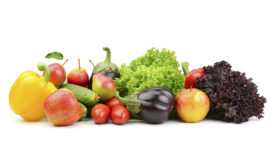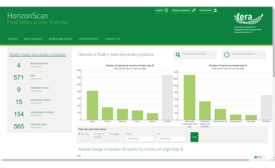Home » Keywords: » food fraud
Items Tagged with 'food fraud'
ARTICLES
Two new tracking trends identified in the data are Canadian consumers’ moderate-to-strong concerns relating to food fraud (91%) and concerns with misleading food labels (89%) for the purpose of marketing.
Read More
Thai Union Group strengthens efforts to combat food fraud
The Combating Food Fraud and Food Defense Strategy will complement the work Thai Union already does under its global sustainability strategy.
September 30, 2019
Research shows global food safety issues increasing in poultry, seafood, vegetables
On a more positive note, milk and dairy product hazard reports are down 4.7% and meat and meat product issues are down 14.1% after a Q2 increase of 9.9%.
December 4, 2018
Decernis acquires USP’s food fraud database
The food fraud database helps food manufacturers, retailers and other stakeholders make informed decisions about the vulnerability of their food ingredients to economically motivated adulteration.
June 25, 2018
Alchemy Systems, U.S. Pharmacopeial Convention collaborate to fight food fraud
USP’s Food Fraud Database can be used to identify which ingredients have a known history of adulterations, including incident reports, inference reports, surveillance records and analytical methods.
February 27, 2017
How to prepare for terrorism in today's food system
It's imperative to implement food defense strategies that mitigate the risk of food terrorism, sabotage and intentional adulteration.
November 8, 2016
NSF International acquires Euro Consultants to expand food safety services
Both NSF International and Euro Consultants Group share a similar commitment to food safety training, auditing and consulting within the food industry.
August 3, 2016
EVENTS
Industry
7/13/16
Amarillo Civic Center
401 South Buchanan St.
Amarillo, TX
United States
Contact: Wendy Harmon
FSNS ANNOUNCES FOOD SAFETY CONFERENCE AND LAB GRAND OPENING JULY 13; Event Features Food Safety Topics, Lab Grand Opening and Temple Grandin Book Signing
Industry
11/2/16
Pearson Convention Centre
Brampton
Canada
Food and Beverage 2017: Trends, Influencers, Innovation
Get our new eMagazine delivered to your inbox every month.
Stay in the know on the latest food and beverage manufacturing markets.
SUBSCRIBE TODAYCopyright ©2024. All Rights Reserved BNP Media.
Design, CMS, Hosting & Web Development :: ePublishing






